"The surprisingly simple truth behind extraordinary results"
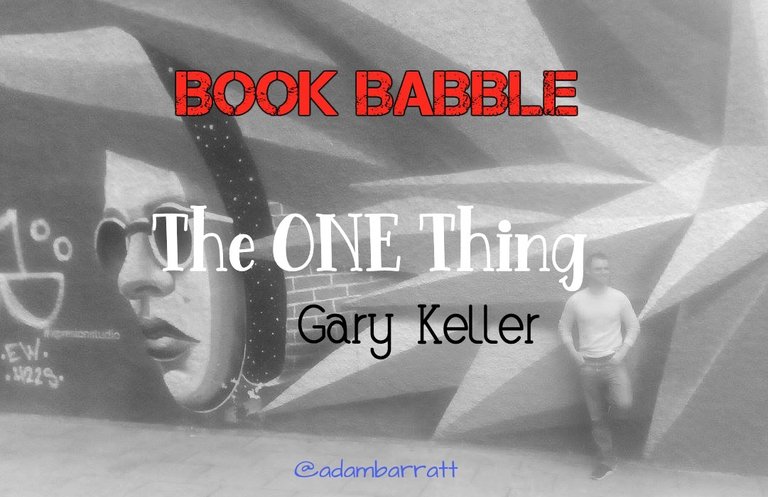
Here we have a great book on productivity and priorities. One of the best personal development books out there with a simple concept, well explained.
I initially read this a couple of times a few years back, and have since been back for a third bite recently. It's a fairly straightforward concept, but that's the point – essentially focusing on a single task or goal to achieve success.
Obviously Gary goes into a bit more detail on techniques and examples but you get the idea. Probably the most important thing to handle in this day and age – how and where you focus your time and energy.
I highlighted a fair chunk of the book, so let's dive straight in!
Some great quotes from the book, followed by my thoughts…
If you chase two rabbits, you will not catch either one - Russian proverb
Trying to do more than one thing means you're not really doing either (or any), just half-assing a couple or a few things. Focus on one, then move on to the next. We know this all too well, but then still try and break the rules and do it all. Not possible (to do any well that is, but you can do more if you're just playing).
“Be like a postage stamp–stick to one thing until you get there.” —Josh Billings
Bit cheesy but I get the point. FOCUS = Follow One Course Until Successful.
“What’s the ONE Thing you can do this week such that by doing it everything else would be easier or unnecessary?”
What's that big mover? That thing that in doing it will help everything else or even make them obsolete. There's a biggy somewhere and we need to find it and execute.
Go small
We try and take on the big stuff and believe that's where the success lies. Yes, it can do, but usually, in order to get there it's in the minutiae and the day to day. Go small, find doable tasks, and that will lead to the bigger results down the line.
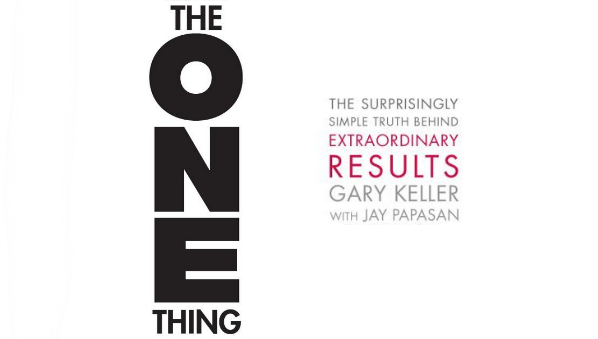
THE DOMINO EFFECT
Great analogy. You push the first domino and that knocks down all the others…
find the lead domino, and whack away at it until it falls
Exactly. What is that lead domino? Find it and attack it. It's always hard starting something, but once there's some momentum each 'domino' will knock out the next.
Passion for something leads to disproportionate time practicing or working at it. That time spent eventually translates to skill, and when skill improves, results improve. Better results generally lead to more enjoyment, and more passion and more time is invested. It can be a virtuous cycle all the way to extraordinary results.
Yeah, it's a good ol' cycle and goes against some of our idealistic views on what's achievable and how we should feel. It isn't all fun and games, but it may become so over time as we get more skilled and enjoy the process and outcomes more.
Worth reading So Good They Can't Ignore You by Cal Newport as he goes into the passion vs skill discussion and how we may have been misled a little. Yes, passion is great but it may be that it's developed rather than something you should pursue first.
Instead of a to-do list, you need a success list — a list that is purposefully created around extraordinary results
A different way of looking at it. To-dos are notoriously boring and sometimes not even adhered do (and sometimes you do stuff that isn't on the list). This would be a success list of what makes a day, a life, you, a success as you see it.
the majority of what you want will come from the minority of what you do
The 80/20 talk has been done to death, but the Pareto Principle holds true with most things. Whether the figure is actually 80/20 or a bit more skewed in either direction is irrelevant. One things's for sure, and that is most of what you achieve is through a minority of efforts, and vice-versa.
“Multitasking is merely the opportunity to screw up more than one thing at a time” — Steve Uzzell
Multi-tasking is a myth. You are doing it in a way, but the reality is you're just switching between tasks, albeit quickly, but not doing them at the same time. This makes things not nearly as effective, and even damaging. Yes, there are times where it is necessary or desirable and certain tasks can be done to a reasonable standard, but for many things it really isn't a good idea.
regularly working at something until it regularly works for you
You start off with the output and working hard to get things created and moving. Then in time, what you've produced will start feeding you. It's cause and effect – and a whole lot more to it of course – but you get what you give… as long as you keep at it.
The trick to success is to choose the right habit and bring just enough discipline to establish it
The tough work is in starting and developing a habit (or breaking one), that's where the true hard work lies. However, after a time it becomes automatic and will just flow without you even thinking about it.
Discipline and habit
As above really. These 2 babies working in unison will take you where you want to go (or not if you're not disciplined and have bad habits).
See the BookBabble on Atomic Habits by James Clear, and these chapters of my books:
The results suggest that it takes an average of 66 days to acquire a new habit. The full range was 18 to 254 days, but the 66 days represented a sweet spot
There you go. You hear all sorts of studies and ideas on habit forming but I think this sounds about right. Yes, you can get things going in about 3 weeks but it's not completely set. There's a bit of a range here, but that 2 month mark is probably the sweet spot for most things where it becomes a part of who you are and automatic.
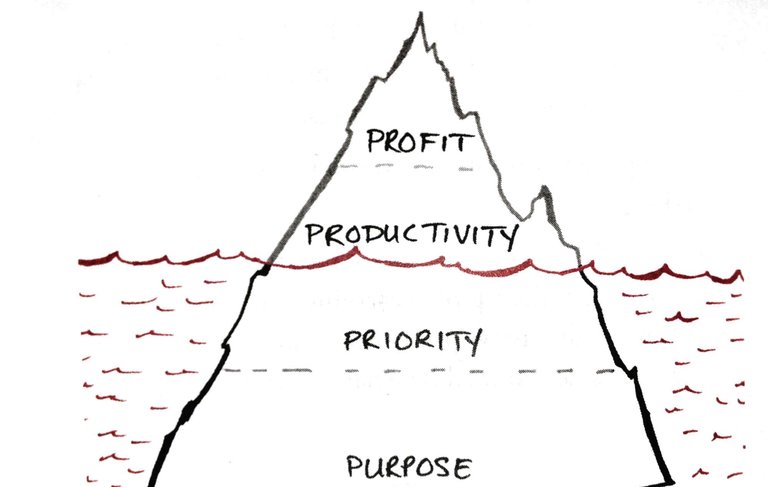
The brain makes up 1/50th of our body mass but consumes a staggering 1/5th of the calories we burn for energy
Fat bastard. There's a lot going on in there, so it makes sense but that brings it into perspective the energy it requires to run well.
One of the real challenges we have is that when our willpower is low we tend to fall back on our default settings
Exactly, habit. This is why getting a habit going and set it going to stand you in good stead. Whatever happens after that, when shit hits the fan, when you don't know what to do… that is what you're going to do. It will just be the natural response.
A balanced life is a lie
A bit like multi-tasking. It's never quite in 'balance', more a case of being slanted in one direction at any given time, then swinging back a little the other way. In fact, would you even want perfect balance? There are times when work is the priority, family/friends, health etc… so it will always be skewed with what you want/need to do. Sometimes moreso than others, but always there, oscillating.
Extraordinary results require focused attention and time. Time on one thing means time away from another. This makes balance impossible
Expansion on the last point. You will always be focused on one area, especially if you want to excel there… so instead of trying the impossible, perhaps embrace it.
Knowing when to pursue the middle and when to pursue the extremes is in essence the true beginning of wisdom
There are times when we need to go extreme, it's not all about the middle ground. Sometimes there will be the requirement, but we just don't stay there. Other times we'll meander in the middle and that's great too when it's appropriate.
In your personal life, go short
In your professional life, go long
Interesting idea. Focus on the here and now more in your personal life, and future goals professionally.
The question of balance is really a question of priority
What's the most important thing? In life in general, but also in the given task or area. What needs to be done? Get that done, and realise you won't be doing something else at the same time. By all means move on to that when that's now the priority.
When you’re supposed to be working, work, and when you’re supposed to be playing, play
Go all in in the situation you find yourself. Don't be distracted and in the other place. This is one of the hardest and most important things, and some are better than others. Keep that focus and attention where it's supposed to be, it'll be far better all round and you can tend to the other aspects when their turn comes.
“We are kept from our goal, not by obstacles but by a clear path to a lesser goal” —Robert Brault
It's not all about obstacles getting in our way, but taking the path of less resistance. That being the easier option so we don't have to put in the hard yards to what we really want.
Thinking big is essential to extraordinary results
For sure, and there was a great book written about that - The Magic of Thinking Big by David Schwartz.
“The rung of a ladder was never meant to rest upon, but only to hold a man’s foot long enough to enable him to put the other somewhat higher.” —Thomas Henry Huxley
Keep moving. Use the steps to help you on your way, but don't dwell.
A good rule of thumb is to double down everywhere in your life. If your goal is ten, ask the question: “How can I reach 20?”
Always go for more. Think bigger. That way you'll probably get more than your initial goal even if you fall short of the more audacious ask.
“Don’t put all your eggs in one basket” is all wrong. I tell you “put all your eggs in one basket, and then watch that basket.”
Possibly a quote from Andrew Carnegie… there's a balance in there somewhere. As in, not putting all your eggs in one basket is a good idea for obvious reasons. Then again you should put a chunk of eggs in a well researched and watched basket as that's the one that will (potentially) net the biggest returns.
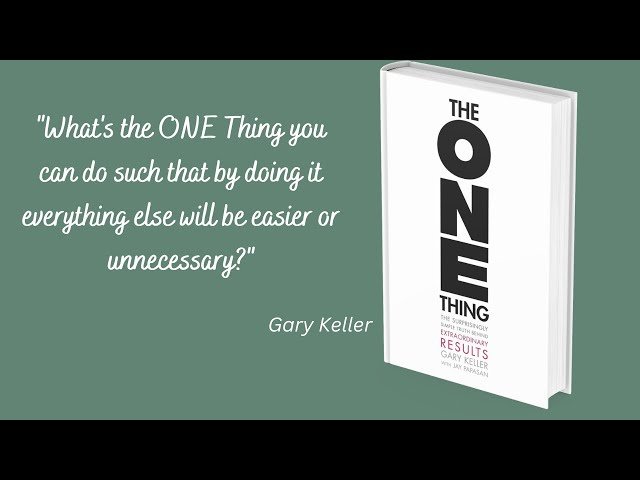
Source unknown
The Focusing Question
The crux of the book. There's one main question asked, which is changed slightly to fit the specific situation. But this is really what the book is based around, and the rest is putting it into practice.
It’s both a map for the big picture and a compass for your smallest next move
It's for the big, life stuff, but also for the day to day smaller tasks. It centres you and brings you back to what's important in that moment.
“What’s the ONE Thing I can do / such that by doing it / everything else will be easier or unnecessary?”
And there it is! The question. It's adapted as I say but that's the basis and the thing we need to keep coming back to to keep us on track.
Your big ONE Thing is your purpose and your small ONE Thing is the priority you take action on to achieve it.
Breaking it down a bit. Your bigger purpose up there, and then the smaller one is the actionable step.
Charles Dickens shows us a simple formula for creating an extraordinary life: Live with purpose. Live by priority. Live for productivity.
Ol' Dickens knows his stuff, and we could do with following that ourselves.
Dr. Martin Seligman, past president of the American Psychological Association, believes there are five factors that contribute to our happiness: positive emotion and pleasure, achievement, relationships, engagement, and meaning. Of these, he believes engagement and meaning are the most important.
Seligman is another who's worth a listen to. He was/is at the forefront of the 'positive psychology' movement and working on the above will lead us to more happiness.
financially wealthy people are those who have enough money coming in without having to work to finance their purpose in life.
That would be the aim. Not having to work, although you still would in some capacity. The point is, the money rolling in is enough to sustain you and you're free to use your resources as you see fit.
Live with purpose and you know where you want to go. Live by priority and you’ll know what to do to get there.
Bigger picture thinking, and smaller picture actions.
people prefer big rewards over small ones, they have an even stronger preference for present rewards over future ones
The sooner and bigger the better! I guess this is fairly obvious but it's worth a reminder of how people think and act, and tapping into that.
Goal Setting to the Now
Working backwards from where you want to be, and bringing it right up to the present to take the action you need to perform right now.
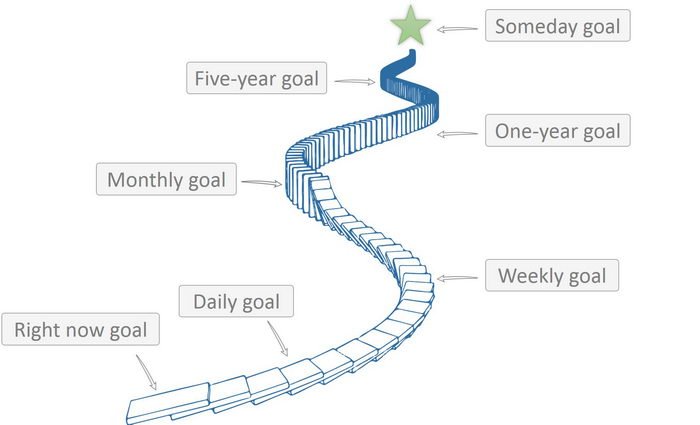
hyperbolic discounting—the farther away a reward is in the future, the smaller the immediate motivation to achieve it
If you haven't got a taste of it, it seems all the more abstract… some distant potential rather than a 'real thing'. That's why we need small and tangible wins on the way to keep us going.
think big—but go small
Ties in with the earlier point of always thinking big and stretching the possibilities, but also always going small when it comes to the actions you take.
planning fallacy
This is where you get a little over optimistic in your judgement about how long things are going to take. There's an error in that assessment, and most things will take longer to achieve.
The most productive people work on event time.(v clock time)
For sure, that should be the main metric. Clock time is just where you are in the day; event time is what you're actually getting done. And that is what moves the needle.
I wrote an article a while back on the 'fallacy of face time' and the changing workplace. Check that out here :)
To experience extraordinary results, be a maker in the morning and a manager in the afternoon
Use your mornings and when you're most alert for the creative activities. Then when that wanes later in the day, you can perform the management type tasks. It varies for each of us of course but as a general rule that would suit most people.
You are the first domino
A good reminder, that we are well it all starts and ends.
remember that the secret to extraordinary results is to ask a very big and specific question that leads you to one very small and tightly focused answer
It's the big and small equation again. Getting this balance and being specific will lead to getting efficient answers and focus our attention and actions.
The highly productive person's daily energy plan:
- Meditate and pray for spiritual energy
- Eat right, exercise and sleep sufficiently for physical energy
- Hug, kiss, and laugh with loved ones for emotional energy
- Set goals, plan, and calendar for mental energy
- Time block your ONE thing for business energy
Thanks Gary! Anything Else?
As I said at the start, a simple and straightforward concept we all know about but hardly ever actually implement. This book takes that point and expands on it with goal setting and life planning based around this central premise.
I think we covered it all in the quotes, so I'll wrap this up with one question:
What's the ONE thing you got from this article and how are you going to implement it?
Video reviews:
Poll:
https://inleo.io/threads/view/adambarratt/re-leothreads-g8zk9ctf
First image my own, others linked to source
- 1-50: First 50 BookBabbles
- 51: THE DAILY STOIC - Ryan Holiday
- 52: MAKE TIME - Jake Knapp & John Zeratsky
- 53: GRIT - Angela Duckworth
- 54: WHAT I TALK ABOUT WHEN I TALK ABOUT RUNNING - Haruki Murakami
- 55: THE PURSUIT OF PERFECT - Tal Ben-Shahar
- 56: THE SLIGHT EDGE - Jeff Olson
- 57: CONTAGIOUS - Jonah Berger
- 58: THE RICHEST MAN IN BABYLON - George S. Clason
- 59: THE 5 AM CLUB - Robin Sharma
- 60: THINK LIKE DA VINCI - Michael Gelb
- 61: INFLUENCE - Robert Cialdini
- 62: THE ONE THING - Gary Keller
- 63: THE 12 WEEK YEAR - Brian Moran & Michael Lennington
- 64: THE POWER OF YOUR SUBCONSCIOUS MIND - Joseph Murphy
- 65: THE UNTETHERED SOUL - Michael A. Singer
- 66: ON WRITING WELL - William Zinsser
- 67: PRINCIPLES - Ray Dalio
- 68: HYPERFOCUS - Chris Bailey
- 69: THE OBSTACLE IS THE WAY - Ryan Holiday
- 70: EXTREME OWNERSHIP - Jocko Willink & Leif Babin
- 71: KNOWN - Mark Schaefer
- 72: THE LAST LECTURE - Randy Pausch
- 73: THE FIVE PEOPLE YOU MEET IN HEAVEN - Mitch Albom
- 74: FOUR THOUSAND WEEKS - Oliver Burkeman
- 75: THE ART OF TAKING ACTION - Gregg Krech
Posted Using InLeo Alpha
It's just that a postage stamp is always waiting to be used as payment for a postal item, but it may not wait if it is cancelled on request, or it ends up in a philatelist's collection, there are risks for it, but it waits, I think that's the essence of the proverb :) !BEER
Congratulations @adambarratt! You have completed the following achievement on the Hive blockchain And have been rewarded with New badge(s)
Your next target is to reach 450 posts.
You can view your badges on your board and compare yourself to others in the Ranking
If you no longer want to receive notifications, reply to this comment with the word
STOPCheck out our last posts:
Congratulations @adambarratt! You received a personal badge!
Thank you for participating in the Leo challenge.
You can view your badges on your board and compare yourself to others in the Ranking
Check out our last posts: